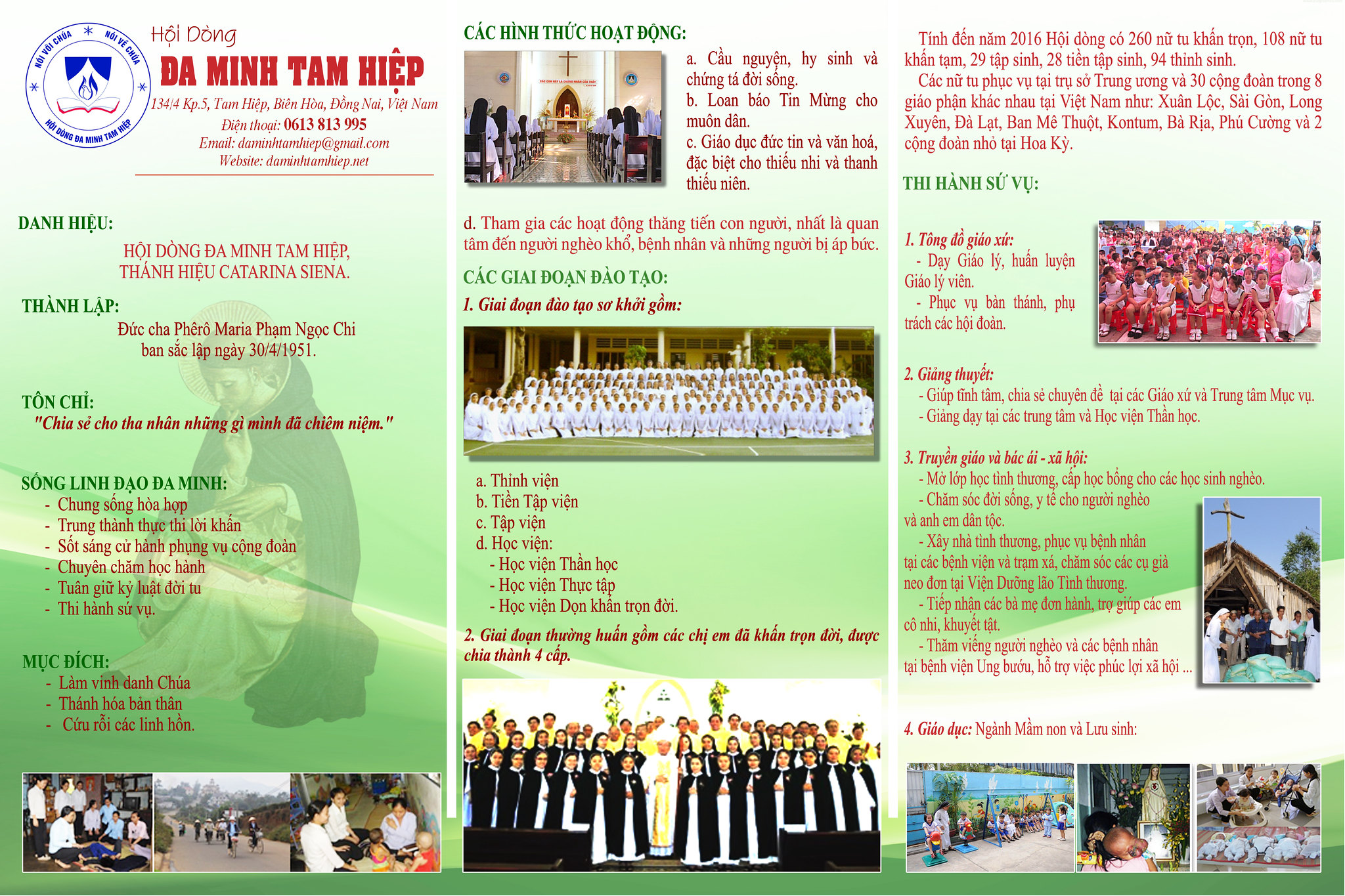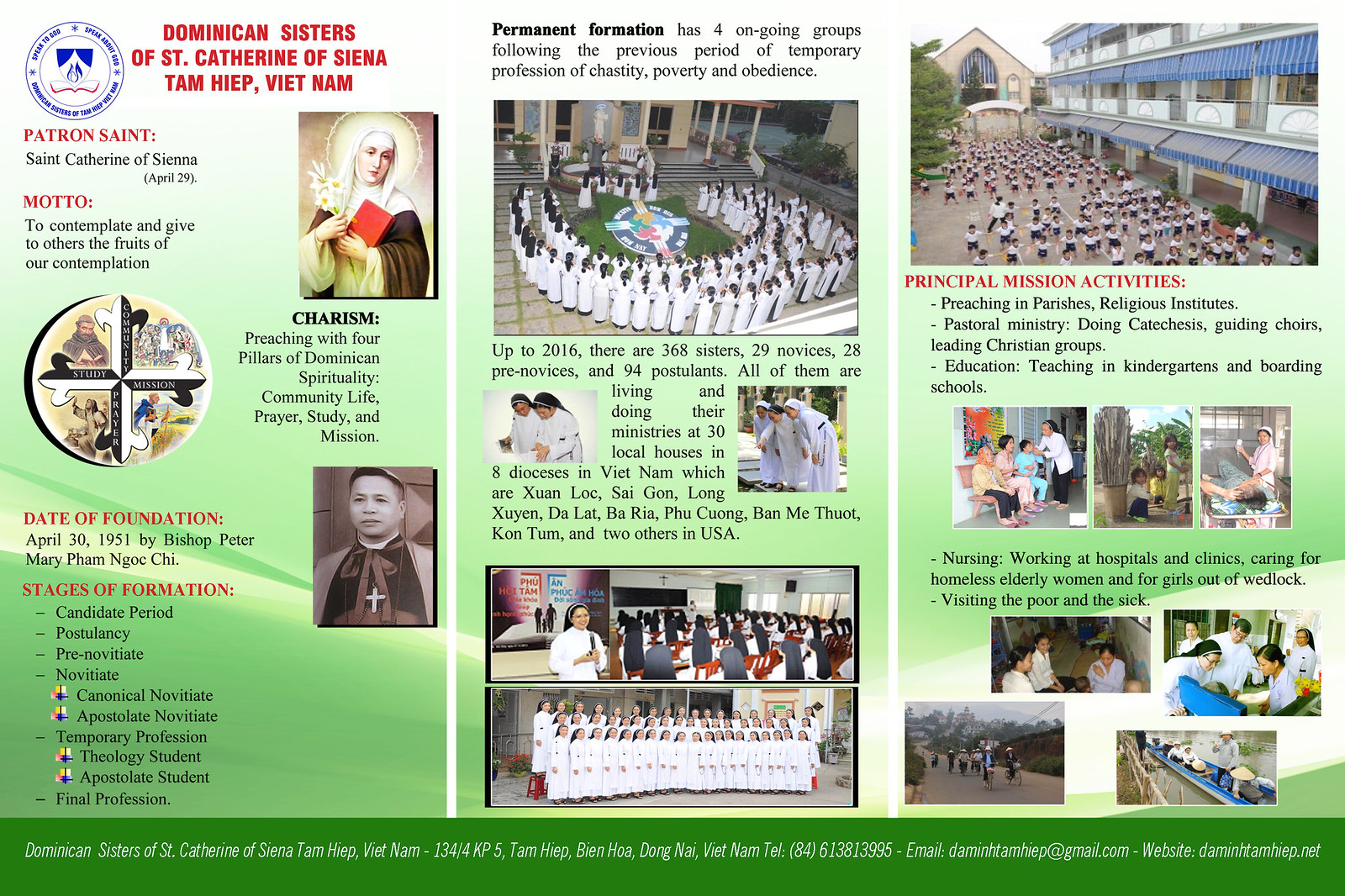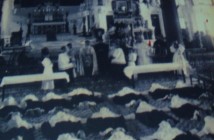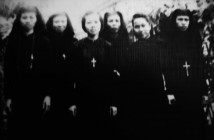
Short history of Dominican Sisters of Tam Hiep
THE EXPERIENCE OF HOPE
OF DOMINICAN SISTERS OF TAM HIEP, VIETNAM
The article is sent to Fr. Benedikt OP and the Dominican family in the Czech Republic. Salve revue number with the text came out sometime in the fall, in Czech language.
Our Congregation, Dominican Sisters of Tam Hiep was founded on April 30th, 1951 by Bishop Peter Mary Pham Ngoc Chi in North Vietnam, following a long history of Dominican life in North Vietnam. Around 1715, some Spanish Dominican missionaries who came from the Philippine Province gathered virgins together in communities to help the missionaries in their work. These communities named Houses of Dominican Blessed were formed and developed in a context of persecution, especially from 1740 to 1883. During this period of nearly 150 years, it is estimated that 130.000 to 300.000 Catholics were killed for their faith. In the 20th century, when the persecutions finished, those ‘Sisters’ again experienced war with weapons, munitions, harassment and threats to their lives and possessions. Many times they had to evacuate, avoiding bombs, and often experiencing starvation and thirst. Although encountering many hardships, the ‘Sisters’ maintained their hope in God and came back together and started again.
As mentioned above, in 1951, the Vietnamese Dominican Congregation was officially founded in North Vietnam from seven Houses of Dominican Blessed. At that time Northern society was in a state of turmoil and tension between the French and Vietnamese, but this fledgling Congregation continued to consolidate and develop. The more the tension developed, the more their faith became strong. Three years later, in 1954 Vietnam was divided into two regions. The North was under the Communist regime. The South was under the leadership of the French. Bishop Peter Maria Pham Ngoc Chi, our founder led a big wave of Catholic immigrants and almost all of the Sisters in the North to the South; the Dominican Sisters settled in Tam Hiep Commune. Our founder has been a very important influence for the Sisters of our Conregation. From then on, we were named Dominican Sisters of Tam Hiep and had to confront the complex political situation for quite along time and had to adapt to the new difficult environment. The Sisters were very poor as were the people who had moved from the North but gradually the Sisters settled and began to work in parishes and established schools, hospitals and orphanages.
In 1975, when the Communists conquered the South, they were determined to suppress the faith. Together with other Congregations, the Sisters in our Congregation were thrown into a state of hopelessness and despair. Everything that belonged to the Church, such as churches, convents, seminaries, schools, hospitals, orphanages, etc… were controlled and confiscated by the Communists. Our Mother House in Tam Hiep was also occupied by soldiers but a small house of the elderly and sick sisters was left because Sisters insisted strongly against moving the elderly. Soldiers stayed in the convent, destroyed the furniture, burnt the books and guarded the main doors to control those going in and coming out. There was a plan to destroy the Chapel in the Mother House but one of our Sisters protested that she would die before they demolished this Chapel. Strangely, the Chapel was not destroyed and it continues to be used until today.
Many sisters had to leave the religious life because there was no place to live together. Those who made their permanent vows or those who took a risk continued to live together. Some Sisters volunteered to make small groups and lived as families in remote areas to work on farms, such as mountainous or new-cultivated lands in order to survive and to keep a belief and hope in Dominican life. In this situation, how did the Sisters maintain their hope in extremely difficult circumstances? They hoped against hope (Rom. 4: 18). They prayed persistently and trusted in God’s word “I am with you always, to the end of the age” (Mt 28: 20). Some Sisters carried the Blessed Sacrament when they went to work, fearing the tabernacle might be destroyed and hence, when they rested they adored the Eucharist. By doing so, they had a chance to pray in order to share with others “the fruits of contemplation”. Hope taught the Sisters about persistence, love and forgiveness. It seems that hope is a paradox for those who do not believe in God but hope taught the Sisters to love and respect others, even though those who persecuted them. The Sisters claimed that God is among us when we love God and when we love each other.
During the time from 1975 to 1980 was a time of exile. The Sisters lived and labored all day long as Vietnamese women similar to a Dominican laity without any outward form of being a religious. They could not wear habits because they needed to avoid the Communists’ suspicion and watchfulness. We wore the Vietnamese dresses in white and black, thus, many recognized us as Dominican religious women. Also, the people could recognize us as religious through praying the Holy Rosary, sharing the Bible together or when working in the field or teaching children and our witness to our faith was understood. The Sisters gave generous help in healthcare, visited the sick and taught Catechism when visiting the needy. As a result, the Sisters were loved by many and many people were baptised to become Catholics. It seems that the Communists were not completely successful in suppressing the Catholic faith, which continues to grow in South Vietnam.
Since the late 1980s, thanks to God, restrictions on the lives and works of the religious have been somewhat eased although many controlling rules continued to exist. The Sisters had been able to return to the convent which had been vandalised but not destroyed. Young women were able to enter the community but secretly. They spent an ascetic, simple life and helped each other proceed to the holiness by prayers, mortification and fraternal correction. They worked in silence and diligence, attending the Holy Mass in the basement of the chapel or chapter. However, the persecution continued in subtle ways. The formatees, formators and even Novices lived in fear and in an uncertain state because the police often came at night to check on numbers at convent. They always were ready to move to another place at any time if the police arrived. Some postulants had to run out of the convent and stay with neighbours who were very poor and had small houses. One Sister remembered having to sleep over night in places where they kept pigs and dogs. Some had to hide in the roof so that the police could not see them. At other times, some postulants hid in the water tank and remained cold and motionless to avoided the torches of the police who were searching for them. It seemed that the government was determind to prevent the growth of new members coming to the Congregation. Nevertheless, the Sisters were not afraid of those difficulties and continued to follow God’s call bravely to serve others in Dominican spirituality. They prayed constantly and mantained their hope that this situation would be changed because God is the Lord of human history. They also kept praying for those who persecuted them and prayed for many blessings and conversion by God’s grace.
We believed that many international orders and governments tried to improve the situation for the religous in Vietnam. As you know, the Vietnamese Church has been blessed with 117 Martyrs who were canonized in 1988 in Rome, in which were 6 Spanish Dominican Bishops, 22 Dominican Priests, Spanish and Vietnamese, 35 Dominican Brothers and a large number were Dominican laity. This was a wonderful gift for the Vietnamese Church and we wished to follow the footsteps of Our Dominican Brothers who had gone before us in God’s strength. We embraced and invoked the Dominican saints who helped us to build the Church as they had. Since 1992, Vietnam was accepted into the ASEAN (the Association of Southeast Asian Nations), the Communists had to change their policy and complied to the free world’s demands. Therefore, the Communists lifted some retrictions and let the local Church as well as the religious participate in some activities in order to help Vietnamese people. We began to ask for permission to go abroad in the Dominican Asian Pacific meetings and to send some members abroad to study. Gaining permission to leave the country was very difficult and many requests were refused.
Since then, the Congregation’s members and their various forms of ministries are vibrant and growing; however, many areas such as practising religion, education, schools are still controlled, and conditions became better and better. After the year of 2000 under the goverment’s control we have been doing mission as follows:
– In the education area, we teach in the kindergartens and boarding schools. We are not allowed to open elementary schools or higher level schools.
– In medical and healthcare, we work at some hospitals and clinics, but we are hardly ever allowed to be the leaders or to open private clinics for the sick.
– In charitable work, we take care for homeless elderly women, for girls out of wedlock, visiting the poor and the emigrants.
– In religious activities, we preach in Parishes, Religious Institutes, do Catechesis, guiding choirs, lead Christian groups. However, for some special events such as the Chapter, the Ordination Masses, Profession Masses, Feast days, we have to ask for permission, and the authorities either allowed us to participate freely, or they would cut apart of our program, or they would attend such celebrations.
– In media communication, it is not easy to use the ways of evangelization. Internet, telephone, website, email, book publishing are under the control of the governments.
Particularly, in 2008, our poor house in Kontum which was serving the mountaineers, the minority race, was destroyed by the government. Because the Sisters demanded to stay, the government let us build a small cottage to live until now. We are not allowed to send young sisters to live with our old sisters. If the bishops, priests, prioress general and her sisters want to visit this community, they must notify the local authorities. Naturally, the sisters are not allowed to teach catechesis, hold rituals for lay people or even wear the habits. Although many difficulties still remain, the Sisters believe that they can be witnesses by their gentle presence, serving the poor, and through sincerity and joy.
However, today the Congregation seems to have opened a new chapter in its history and our Dominican charism is more consolidated. Presently, we can wear habit and live the community life, large or small as we arranged. We can transfer sisters from place to place with local authority’s permission so that our services can respond better. We are ordered to notify them the list of postulants, novices, student sisters each year. For the attendances at international assemblies or studying abroad we are required to ask for permission. There are now nearly four hundred Sisters and many Postulants apply to join us. In fact, through our community life, liturgy and prayer people can perceive and wish to join us as Dominican Laity. The passion for missions and study are very strong. Some sisters are encouraged to study overseas and then returned to Vietnam where they teach young sisters and develop the Congregation. In the variety of apostolic missions, we are also recognized as Dominican Sisters of Tam Hiep when we give priority to serve the word of God such as doing catechesis, sharing the Gospel, preaching in parishes and in pastoral centers and participating in the promotion for justice and peace.
To conclude, as Vietnamese Sisters, the Dominican Sisters of Tam Hiep have suffered intensely. But we believe that the Holy Spirit is doing the mission and guiding the history. As the Missionaries of Paris, Spanish and others went overseas to come to Vietnam, learned Vietnamese language, lived as the local people, did the missions of the Catholic Church and became martyrs, we have put our hope in God and God’s word, and undoubtedly, hope keeps the Congregation alive and able to move forward. For us, hope deepens our love of God and of others even at times of despair and persecution. Through the suffering, we are given true hope through the resurrection of Jesus Christ. We strongly believe that there is no guarantee that Christians will ever be free from suffering because there is no purification without suffering, no resurrection without the cross. We trust in the intercession of St Dominic O Spem miram!
By Thu Lieu, Sang Dinh, Thom Nguyen and The Tran, OP
Dominican Sisters of Tam Hiep, Vietnam.











